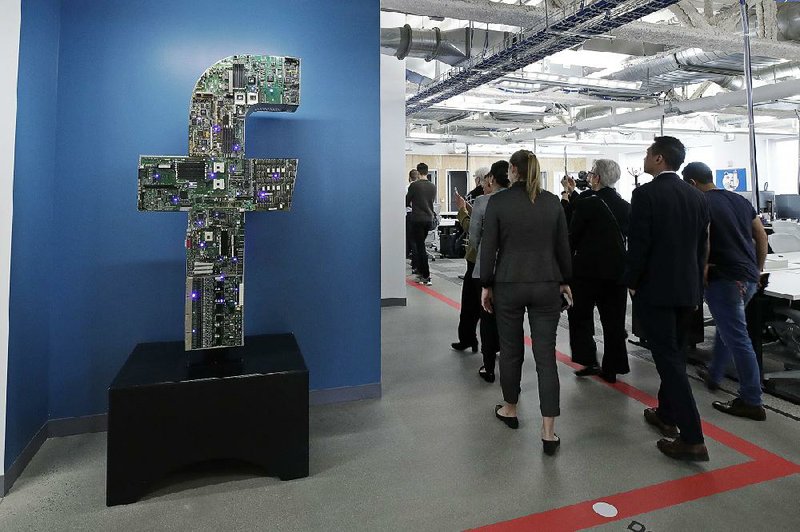SAN FRANCISCO -- Facebook unveiled an ambitious plan Tuesday to create a new digital currency similar to Bitcoin for global use, one that could drive more e-commerce on its services and boost ads on its platforms.
Calibra, a newly formed Facebook subsidiary, says its goal is to provide financial services to billions of people around the world who lack access to banking or credit cards, a large portion of whom are women in developing countries. About 70% of small businesses in developing countries don't have access to credit, Facebook said, and migrant workers lose $25 billion every year to service fees and other costs as they send money they've earned in one country to their loved ones at home.
A cryptocurrency could eliminate many of those costs, and with plans to have the currency available in a digital wallet available in Messenger and WhatsApp, in addition to a stand-alone app, Calibra's Libra currency could bring cryptocurrency into the mainstream.
But the effort, which Facebook is launching with partners including PayPal, Uber, Spotify, Visa and Mastercard, could also complicate matters for the beleaguered social network. Facebook is currently under federal investigation over its privacy practices, and along with other technology giants also faces a new antitrust probe in Congress.
"It's a bold and strategic move that has clear risks as well as opportunities tied to it," said Wedbush Securities analyst Dan Ives. "This could raise further yellow flags as more regulators focus on Facebook."
David Marcus, the head of Facebook's cryptocurrency operation, said in a tweet Tuesday that feedback from customers has been "loud and clear" about keeping social media and financial data separate.
"We understand we will have to earn your trust," he wrote.
Libra is scheduled to launch in the next six to 12 months. Facebook is taking the lead on building Libra and its underlying technology; its more than two dozen partners will help fund, build and govern the system. Facebook hopes to raise as much as $1 billion from existing and future partners to support the effort.
Facebook also could use its own currency to drive more people to make purchases from ads on its social media sites, said Gartner analyst Avivah Litan, who based her comments on press reports about Libra that preceded Facebook's formal announcement. "This is about fostering more sales within an ad to get more business from advertisers to make ads more interesting on Facebook," she said.
Backing by familiar corporations might also make Libra the first Bitcoin-like currency with mass appeal. Such cryptocurrencies have generally failed to catch on despite a devout following among curious investors and innovators. Bitcoin itself remains shrouded in secrecy and fraud concerns, not to mention wild value fluctuations, making it unappealing for the average shopper.
Libra will be different, Facebook says, in part because its value will be pegged to a basket of established currencies, such as the U.S. dollar, the euro, and the yen. Each purchase of Libra will be backed by a reserve fund of equal value held in real-world currencies to stabilize Libra's value.
Facebook won't run Libra directly; instead, the company and its partners are forming a nonprofit called the Libra Association, headquartered in Geneva, that will oversee the new currency and its use. The association will be regulated by Swiss financial authorities, Facebook said.
Libra partners will create incentives to get people and merchants to use the coin. That could range from Uber discounts to a Libra bonus paid when users set up a Calibra wallet, although the companies haven't laid out specifics.
Many privacy questions remain unanswered, though. Cryptocurrencies store all transactions on a widely distributed, encrypted "ledger" known as the blockchain. That could make the Libra blockchain a permanent record of all purchases or cash transfers every individual makes, even if they're stored under pseudonyms rather than real names. Facebook said people can keep their individual transactions from appearing on the blockchain by using Calibra's wallet app, though in that case, Calibra would have a user's data instead.
Calibra pledges that it won't share transaction data from details of Libra user's financials with Facebook unless compelled to do so in criminal cases. Still, if people are using Facebook products to buy things and send money, it's possible Facebook will be able to track some data about shopping and money transferring habits.
Facebook's plan ran into immediate political opposition in Europe, with calls for tighter regulation of the social-media giant.
"It is out of question" that Libra "become a sovereign currency," French Finance Minister Bruno Le Maire said in an interview on Europe 1 radio. "It can't and it must not happen."
Le Maire called on the Group of Seven central bank governors, guardians of the global monetary system, to prepare a report on Facebook's project for their July meeting. His concerns include privacy, money laundering and terrorism finance.
Information for this article was contributed by Rachel Lerman and Mae Anderson of The Associated Press; by Peter Holley and Rachel Siegel of The Washington Post; and by Alastair Marsh of Bloomberg News.
Business on 06/19/2019
